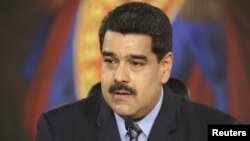Venezuela's electoral board said it was the only body allowed to reform referendum rules governing removal of the country's president, throwing cold water on opposition plans to recall President Nicolas Maduro amid an economic crisis.
The opposition, which won control of the National Assembly in a December election, says removing Maduro is the only way to avoid a severe recession, product shortages and triple-digit inflation from worsening.
It is trying to push through a law accelerating the process to hold a referendum so the vote can happen this year.
Maduro, 53, says the opposition is planning a coup and has vowed to stay in office until his term ends in 2019.
He got a boost from the National Electoral Council, or CNE, widely seen as aligned with his leftist government.
The opposition's proposed new referendum law "is being undertaken outside the constitutional framework," CNE President Tibisay Lucena said in a letter sent on Monday to the head of the National Assembly.
The assembly's president, Henry Ramos, said on Tuesday the opposition would press on with plans for a recall referendum, one of several strategies it is eyeing to remove Maduro, who won a 2013 election to replace the late Hugo Chavez.
Just under two-thirds of Venezuelans think Maduro's presidency should end this year, a survey by a leading pollster said last month.
Time is of the essence. If authorities delay a referendum into 2017, which Maduro then loses, his vice president would be allowed to complete his term rather than there being a new election.
"We need this law to shorten the time limits because if this is left with the CNE ... they'll delay it forever," Ramos said.





